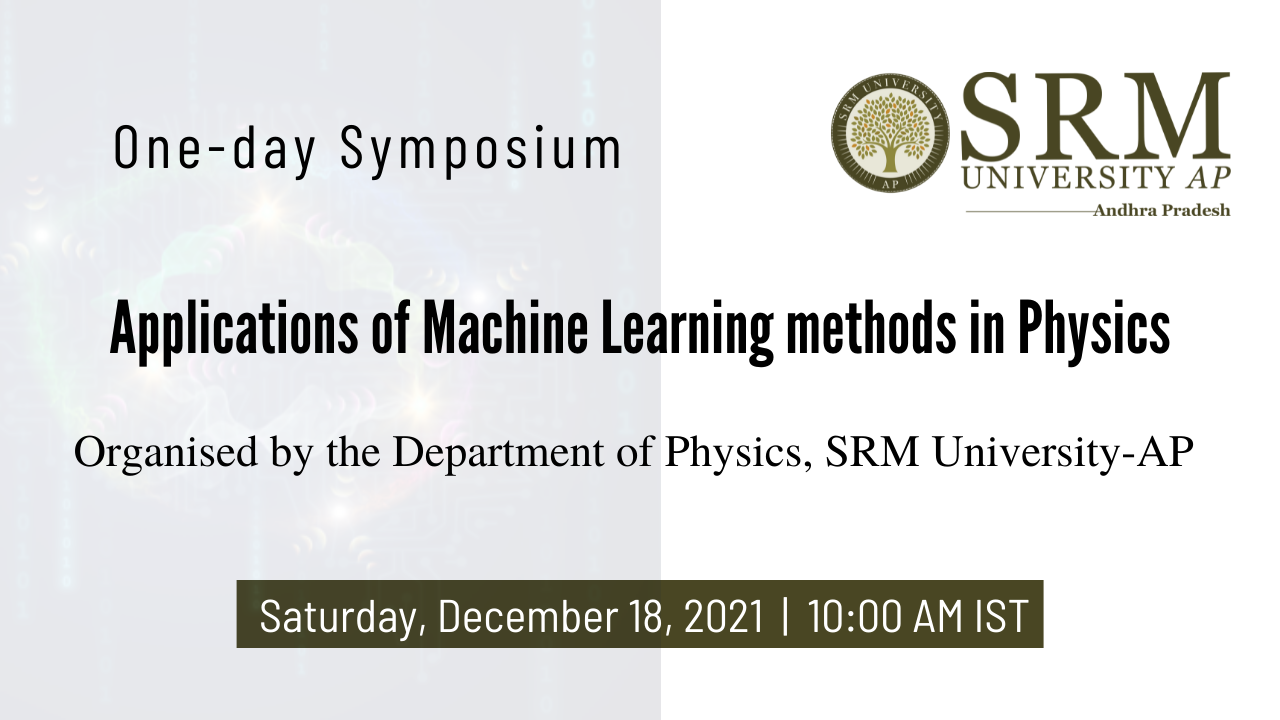
The Department of Physics at SRM University-AP is organising a one-day symposium with national and international academicians on the theme Applications of Machine Learning Methods in Physics. The programme which will begin at 10.00 am on December 18, 2021, will deeply look into two domains of research, namely Particle Physics and Statistical Physics. Eminent experts from computer science and physics domains will deliver talks for a wider audience, especially for students of basic sciences and engineering streams. The event is going to be entirely through Online mode. Dr Amit Chakraborty and Dr Soumyajyoti Biswas from the Department of Physics, SRM University-AP are the conveners of the symposium.
Programme Schedule of the Invited Lectures:
Time: 10.05 – 11.05 AM (IST)
Speaker: Prof Vineeth N Balasubramanian (IIT Hyderabad)
Title: Explainable Deep Learning: Overview, Trends and Challenges
Abstract: The last decade has seen rapid strides in Artificial Intelligence (AI) moving from being a fantasy to a reality that is a part of each one of our lives, embedded in various technologies. A catalyst of this rapid uptake has been the enormous success of deep learning methods for addressing problems in various domains including computer vision, natural language processing, and speech understanding. However, as AI makes its way into risk-sensitive and safety-critical applications such as healthcare, aerospace and finance, it is essential for AI models to not only make predictions but also be able to explain their predictions. This talk will introduce the audience to this increasingly important area of explainable AI, describe salient methods in explainable deep learning, discuss open challenges as well as present some of our recent research in this domain.
Time: 11.30 AM – 12.30 PM (IST)
Speaker: Dr Girish Varma (IIIT Hyderabad)
Title: Deep Generative Methods and Applications
Abstract: Generative methods deals with the modelling of complex high dimensional probability distributions. With the advent of deep neural networks, these methods have become more common with the discovery of new techniques like GANs. Such methods can learn to generate images, graphs etc even without using labelled data. In this talk, we will give some of the common deep generative modelling techniques like GANs, Variational Autoencoders, Normalizing Flows. We will also look at some example applications in Style Transfer, Super Resolution in Computer Vision, Conditional Generation of Molecules in Physics etc.
Time: 2.00 – 3.00 PM (IST)
Speaker: Dr Sanmay Ganguly (University of Tokyo, Japan)
Title: The Deep Relation Between Particle Physics and Machine Learning
Abstract: At the CERN Large Hadron Collider (LHC) experiment, trillions of protons get smashed with each other at very high energies every second. Remnants of this collision are collected and studied to infer what fundamental interactions are happening at the core. Analysing and extracting meaningful physics information out of this large data is a highly challenging statistical analysis, part of which has to be carried out in real-time. Modern deep learning techniques have brought a change in paradigm in the whole field, where it is observed that the application of ML truly impacts at all corners. In this presentation the speaker will try to give a general overview of the ongoing ML activities, mainly highlighting the areas in the context of LHC physics and shortly touch other branches of HEP.
Time: 3.30 – 4.30 PM (IST)
Speaker: Prof Lasse Laurson (Tampere University, Finland)
Title: Machine Learning Plastic Deformation of Crystals
Abstract: The speaker will present an overview of our recent efforts to apply machine learning to predict the fluctuating plastic deformation process of small crystals, mediated by the stress-driven motion of dislocations. To this end, we use machine learning to establish mappings between the initial state of a sample and the corresponding stress-strain curve, considering different loading protocols and geometries of the dislocation assembly. He will start with a discussion of machine learning the depinning process of edge dislocation pileups, after which he will consider the problem of machine learning-based prediction of the stress-strain response of two- dimensional systems of discrete dislocations subject to stress-controlled and strain-controlled loading.
Register soon and claim your seats at this one-day international online symposium organised by the Department of Physics, SRM University-AP!!

